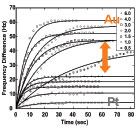|
|
Research
|
Genetically Engineered Materials Science and Engineering Center - Research Vision: With wisdom gained from long experience, Mother Nature has evolved mechanisms of simplicity and elegance to synthesize soft and hard tissues exhibiting remarkable functional properties. Nature achieves these feats of engineering by making use of molecular building blocks and by controlling material assembly in a hierarchical manner from the nano- to the macroscale.  With a growing understanding of the processes involved came the realization that biological principles may have applications for solving problems in human-made systems. Traditionally, biomimeticists have focused on emulating or duplicating biosystems using mostly synthetic components and conventional approaches. By merging recent advances in molecular biology and genetics with state-of-the-art engineering and characterization from the physical sciences, our goal is to shift the biomimetic materials science paradigm from imitating Nature to designing and engineering natural materials to perform artificial functions. In this Center, we combine Nature's proven molecular tools with synthetic nanoscale constructs to make molecular biomimetics a full-fledged methodology. To this end, we have assembled a multidisciplinary team with expertise in diverse and synergistic areas ranging from molecular biology and chemistry to materials sciences and engineering. With a growing understanding of the processes involved came the realization that biological principles may have applications for solving problems in human-made systems. Traditionally, biomimeticists have focused on emulating or duplicating biosystems using mostly synthetic components and conventional approaches. By merging recent advances in molecular biology and genetics with state-of-the-art engineering and characterization from the physical sciences, our goal is to shift the biomimetic materials science paradigm from imitating Nature to designing and engineering natural materials to perform artificial functions. In this Center, we combine Nature's proven molecular tools with synthetic nanoscale constructs to make molecular biomimetics a full-fledged methodology. To this end, we have assembled a multidisciplinary team with expertise in diverse and synergistic areas ranging from molecular biology and chemistry to materials sciences and engineering.
|
The Scientific Research and The Team: Through the NSF-MRSEC program, and by pooling resources and facilities, we established an internationally-reaching Genetically Engineered Materials Science and Engineering Center (GEMSEC) that will enable new collaborative scientific, educational, and outreach activities in molecular biomimetics. The scientific objectives of GEMSEC, pursued by a single Interdisciplinary Research Group (IRG) include the fundamental issues in: i. Combinatorial biology and post selection engineering of inorganic/synthetic binding peptides; ii. Mechanisms of peptide-molecular recognition; iii. Computational biology and bioinformatics; iv. Natural and synthetic designer proteins as molecular templates; v. Bioinorganic phases and synthesis; vi. Bio-enabled nanophotonics.
|

|
|
|
|
|
|




 With a growing understanding of the processes involved came the realization that biological principles may have applications for solving problems in human-made systems. Traditionally, biomimeticists have focused on emulating or duplicating biosystems using mostly synthetic components and conventional approaches. By merging recent advances in molecular biology and genetics with state-of-the-art engineering and characterization from the physical sciences, our goal is to shift the biomimetic materials science paradigm from imitating Nature to designing and engineering natural materials to perform artificial functions. In this Center, we combine Nature's proven molecular tools with synthetic nanoscale constructs to make molecular biomimetics a full-fledged methodology. To this end, we have assembled a multidisciplinary team with expertise in diverse and synergistic areas ranging from molecular biology and chemistry to materials sciences and engineering.
With a growing understanding of the processes involved came the realization that biological principles may have applications for solving problems in human-made systems. Traditionally, biomimeticists have focused on emulating or duplicating biosystems using mostly synthetic components and conventional approaches. By merging recent advances in molecular biology and genetics with state-of-the-art engineering and characterization from the physical sciences, our goal is to shift the biomimetic materials science paradigm from imitating Nature to designing and engineering natural materials to perform artificial functions. In this Center, we combine Nature's proven molecular tools with synthetic nanoscale constructs to make molecular biomimetics a full-fledged methodology. To this end, we have assembled a multidisciplinary team with expertise in diverse and synergistic areas ranging from molecular biology and chemistry to materials sciences and engineering.



